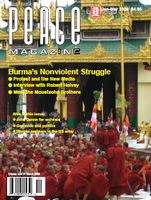
Peace Magazine Jan-Mar 2008, page 28. Some rights reserved.
Search for other articles by Shirley Farlinger (reviewer) here
Douglas Roche. Novalis, Saint Paul University, Ottawa. 2007, 216 pp. $22.95.
After reading several bad-news books in a row, I turned gratefully to Douglas Roche's latest book. Roche reaches into his vast experience to find evidence of our "global conscience," which he describes as "that mysterious quality in each of us that tells us right from wrong." Acting against your conscience is a sin, according to St. Paul.
Roche is sinless as he stalks the corridors of power, especially the United Nations, on his long quest to rid the world of nuclear weapons.
Born in 1929, Roche's life spans careers as a Conservative Member of Parliament (1972-1984), Ambassador for Disarmament (1984-89), chair of the UN Disarmament Committee (1988), and Senator (1988-2004). And he teaches at the University of Alberta. How did he do all that and still author 17 books? Get up at 5 a.m., he advises.
For Roche, "Global conscience is a reality, even a phenomenon, of the new age in which the planet has become our common home." In a foreword Roméo Dallaire agrees: "It is imperative that we all realize that we are all in the same leaky boat together."
Roche notes that "the self-proclaimed superiority of the West leads to humiliation and anger in many parts of the world."
A devout Catholic. Roche nevertheless sees problems with religion. "It is not just religious leaders who are afraid of integrated thinking, ... who are convinced that the sole purpose of religion is to be a vehicle between humankind and God. Such thinking... ignores or greatly diminishes the social responsibilities that flow from the command to love our neighbors as ourselves." Religion has been "hijacked by extremists," he believes.
At the UN's 60th birthday, leaders agreed that sustainable development and human rights are integral parts of security. With Dallaire's Rwanda experience in mind, Roche wants a "UN emergency police force to prevent genocide and crimes against humanity."
Roche writes that on February 15, 2003, more than 10 million people in 600 places marched against the looming war in Iraq. That proves to him that war is futile and must be outlawed. He notes that over 100 wars have quietly ended since 1988. More wars ended than started.
How about the military-industrial complex? "When tax-payers finally figure out they are being lied to as well as gouged, the stocks of armaments will undergo new scrutiny." The US National Priorities Project is working on it.
That is just one of the 17 peace groups Roche highlights. Half of them were new to me -- I must google more often. All the e-mail addresses and mandates of the groups are given. His own group, Parliamentarians Global Action, connects 1300 legislators in 114 parliaments with civil society.
Roche admits that the struggle is intense. Gains listed are the Kyoto Protocol, the treaty banning landmines, the International Criminal Court, the UN peacekeeping missions, the Nuclear Non-Proliferation Treaty, and the UN Millennium Goals. "The US rejection of most of these and rescinding its commitment to the NPT ... have all undermined the effectiveness of the UN." Roche recommends UN reform and suggests a standing volunteer peacekeeping service.
Addressing justice and poverty has always been a feature of Roche's writing and teaching. Inspired by An Inconvenient Truth, he is now onto climate change. He notes that nuclear power is considered necessary to limit climate change. I'd rather he took a stronger stand against nuclear power.
The focus of Roche's life has been on ending nuclear weapons by having countries live up to the NPT or by a UN Convention to ensure the elimination of all nuclear weapons. We still have 27,000. When they're gone Roche should get a Nobel Peace Prize.
"Global conscience keeps driving us forward to a world of greater care and mutual respect." The evidence of it is in the activities of countless members of civil society - you, me and our darned conscience.
Reviewed by Shirley Farlinger, a Toronto activist and writer.

Peace Magazine Jan-Mar 2008, page 28. Some rights reserved.
Search for other articles by Shirley Farlinger (reviewer) here